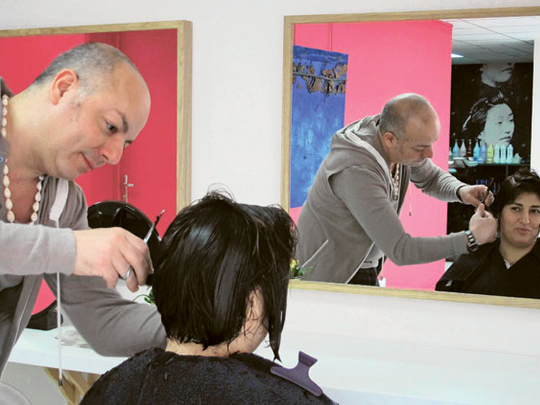
Paris The Josephine beauty parlour in northern Paris celebrated its first birthday Thursday and the success of a simple idea: When life is ugly, make women feel beautiful.
Some 1,200 disadvantaged women — abuse victims, former convicts or addicts, disabled women, single unemployed mothers — have come for a professional haircut and makeup, or to borrow clothes for a job interview, since it opened on International Women's Day a year ago.
Thanks to volunteer workers and private sponsors, it's just €3 (Dh14.60) for a haircut including colour or highlights, less than the cost of a cafe au lait in a Parisian bistro. But the salon's real attraction is the boost to morale, confidence and even job prospects that it provides.
In a city synonymous with women's beauty and fashion, this salon is the first to reach out to the disenfranchised, at a time when France is struggling to lower jobless rates and shrink a growing gap between the rich and poor. Similar projects have sprouted up in the United States and elsewhere.
"It's better than for Hollywood stars. Over there, there are only lights. Here, there is something more," says Souad, a 39-year-old mother of three, just before undergoing the first facial of her life.
"Without getting into our personal lives, they know how to comfort us," she says of the volunteers working at the parlour. She, like many women who come to the salon, asked that her last name not be published because they didn't want to be identified as destitute or otherwise troubled.
Some of the women are referred to the parlour by charitable associations, others come of their own initiative, in which case they need to show documents proving they are in a difficult situation.
Hairdresser Lucia Iraci, who created the Josephine salon, started volunteering several years before. First she went to rundown housing projects, liaising with local charities and setting up makeshift hair studios in kitchens or dining halls.
Then she welcomed poor women in her own hair salon, in the chic Saint-Germain-des-Pres neighbourhood on Paris' Left Bank, on Mondays, when the shop was closed to other customers.
"When things are going bad, you hide in your bed and you stop taking care of yourself," she said in an interview. "I thought that through beauty one could give back this self-esteem that you lose when you're not well."












